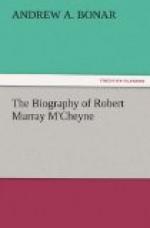His diary does not contain much of his feelings during his residence in Dundee. His incessant labors left him little time, except what he scrupulously spent in the direct exercises of devotion. But what we have seen of his manner of study and self-examination at Larbert, is sufficient to show in what a constant state of cultivation his soul was kept; and his habits in these respects continued with him to the last. Jeremy Taylor recommends: “If thou meanest to enlarge thy religion, do it rather by enlarging thine ordinary devotions than thy extraordinary.” This advice describes very accurately the plan of spiritual life on which Mr. M’Cheyne acted. He did occasionally set apart seasons for special prayer and fasting, occupying the time so set apart exclusively in devotion. But the real secret of his soul’s prosperity lay in the daily enlargement of his heart in fellowship with his God. And the river deepened as it flowed on to eternity; so that he at least reached the feature of a holy pastor which Paul pointed out to Timothy (4:15): “His profiting did appear to all.”
In his own house everything was fitted to make you feel that the service of God was a cheerful service, while he sought that every arrangement of the family should bear upon eternity. His morning hours were set apart for the nourishment of his own soul; not, however, with the view of laying up a stock of grace for the rest of the day,—for manna will corrupt if laid by,—but rather with the view of “giving the eye the habit of looking upward all the day, and drawing down gleams from the reconciled countenance.” He was sparing in the hours devoted to sleep, and resolutely secured time for devotion before breakfast, although often wearied and exhausted when he laid himself to rest. “A soldier of the cross,” was his remark, “must endure hardness.” Often he sang a psalm of praise, as soon as he arose, to stir up his soul. Three chapters of the word was his usual morning portion. This he thought little enough, for he delighted exceedingly in the Scriptures: they were better to him than thousands of gold or silver. “When you write,” said he to a friend, “tell me the meaning of Scriptures.” To another, in expressing his value for the word, he said, “One gem from that ocean is worth all the pebbles of earthly streams.”
His chief season of relaxation seemed to be breakfast-time. He would come down with a happy countenance and a full soul; and after the sweet season of family prayer, forthwith commence forming plans for the day. When he was well, nothing seemed to afford him such true delight as to have his hands full of work. Indeed, it was often remarked that in him you found—what you rarely meet with—a man of high poetic imagination and deep devotion, who nevertheless was engaged unceasingly in the busiest and most laborious activities of his office.




